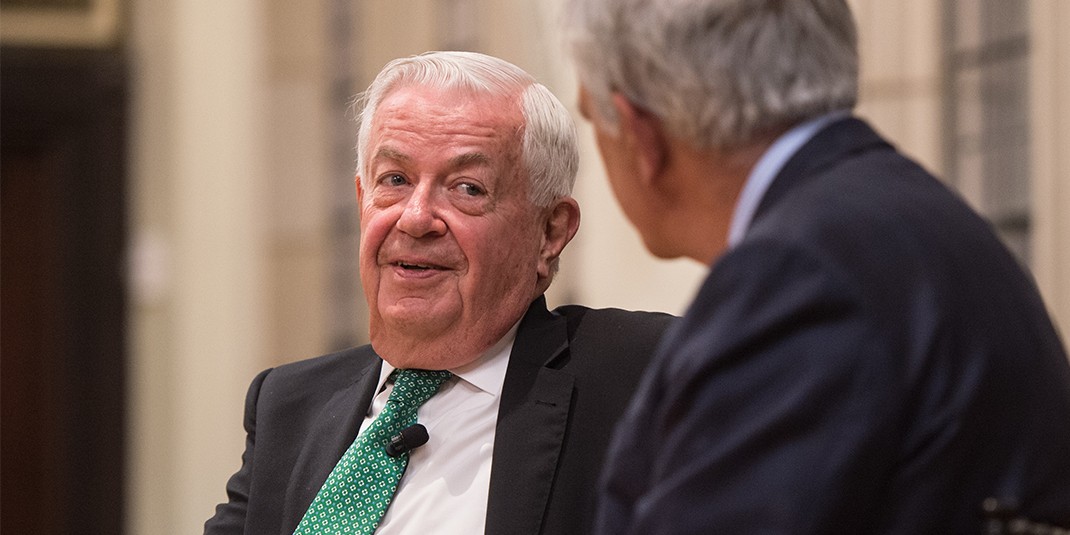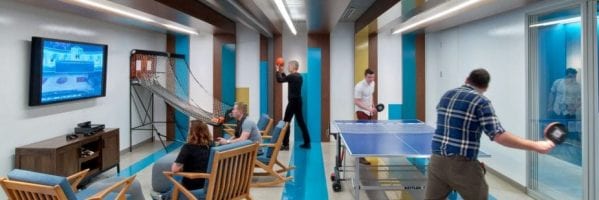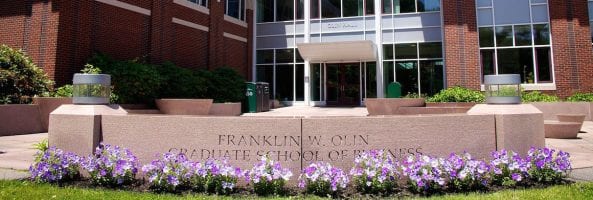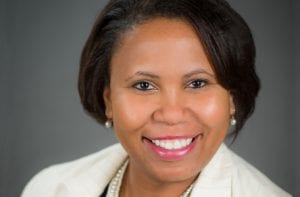HBS Examines the Allure of White-Collar Crime, and More – Boston News

Welcome back and a happy 2019!
Let’s explore some of the most interesting stories that have emerged from Boston business schools this week.
Interviewing White-Collar Criminals: 6 Tips from Harvard Business School’s Eugene Soltes – Journalist’s Resource
Denise-Marie Ordway from Journalist’s Resource recently profiled HBS professor Eugene Soltes, who’s 2016 book Why They Do It: Inside the Mind of the White-Collar Criminal surveys what “drove dozens of wealthy, successful businessmen to become white-collar criminals.”
Soltes offered six tips for journalists on how to build trust and develop rapports with potential sources behind bars.
- “Don’t lead with personal questions and questions that probe into the meatiest details of a convict’s crimes.”
- “Have a plan for whether and how you’ll use sensitive information that sources might divulge once they trust you.”
- “If you want prisoners to talk to you, write them a letter.”
- “When interviewing individuals who are incarcerated, choose phone calls over in-person meetings. You can develop a rapport more quickly through four 15-minute phone calls than one hour-long, in-person conversation.”
- “Establish a system of checking your biases to limit the impact your relationships with sources could have on your work.”
- “If you’re describing someone’s feelings, opinions or mindset, consider letting that person review what you have written to make sure it represents them accurately.”
You can read more from the Soltes profile on white collar criminals like Bernie Madoff in Journalist’s Resource.
Stocks & Bonds, Eggs & Bacon – Sawyer Business School
In early December, 2018, the first Summa Breakfast at the Sawyer Business School featured Amundi Pioneer Asset Management CIO Ken Taubes, MBA ’84, who offered his insights into “where the global economy has been and where he thinks it is going.”

A look inside the Summa Breakfast, held last month at Sawyer Business School / Photo via suffolk.edu
Taubes was surprisingly optimistic: “The dollar’s been strong, and the economy’s fine. In the macro sense for consumers, it hasn’t been this good in a long time.”
He also advises attendees to “turn off the noise and look for opportunities.”
You can read more about the recent Sawyer event here.
The Billionaire Next Door – Carroll School News
Boston College’s Joseph E. Corcoran Center for Real Estate and Urban Action recently hosted billionaire philanthropist Bill Cummings, a “model real estate developer with a strong conscience,” who spoke to roughly 70 BC community members.
After an overview of Cummings’ inspiring rags-to-riches story, along with a remarkable career ascent, he urged attendees to “do the things you want to do, and do them reasonably well.”

“An entrepreneur won’t find success by getting into a putatively lucrative industry that he’s not passionate about,” Cummings said at a recent BC event. / Photo via bc.edu
Cummings was recently honored as one of the Top 50 Givers by Forbes. The Cummings Foundation, according to the article, has “awarded more than $200 million to nonprofits in the Boston area.”
“The grants have made an impact near and far, from soup kitchens and homeless shelters in Essex, Middlesex, and Suffolk counties, all the way to Rwanda, where the foundation has established medical centers in collaboration with Boston-based nonprofit Partners in Health.”
Cummings closed with a paraphrased quote from dancer and actress Eleanor Powell:
“What we are is God’s gift to us. What we become, and what we do with our lives, is our gift to God.”
You can read more about Cummings here.
The Best Business Schools for a Career in Project Management

Broadly defined by the Project Management Institute, project management is “the application of knowledge, skills, tools, and techniques … to meet a project’s requirements.”
A successful project comes to fruition only with the leadership of someone who is trained in time management, resource allocation, negotiation, conflict resolution, and budget planning. These are all skills one can acquire with a project management focused MBA. Continue reading…
3 Professional Life Hacks from The ‘Master of Connections’, and More – Boston News

Let’s explore some of the most interesting stories that have emerged from Boston business schools this week.
3 Professional Life Hacks from a Billionaire Introvert – MIT Sloan Newsroom
In a recent podcast with MIT Sloan School of Management Principal Research scientist Andrew McAfee, LinkedIn co-founder Reid Hoffman thoroughly explained how one person can maintain massive success despite their habits as an introvert.
Hoffman explains three simple professional life hacks that help his process, of which include:
- “Deliberately leave some room for serendipity.”
- “Find someone who knows you well enough to refer you to me and knows me well enough that I care about the reference.”
- “Embrace your skillset.”
On the latter, Hoffman says:
“What I learned was that private company boards are a very good use of my skillset because more or less … they go ‘here’s what we’re working on. That’s like sport, that I’m like ‘oh, I enjoy this.’ How do we solve a customer acquisition problem, how do we solve an executive hiring problem, how do we solve a competition problem, how do we solve a need to reinvent the product problem; all of these kinds of things. That’s what makes this game hard, and I enjoy that.”
You can read more from the Hoffman podcast here.
Work Your Magic: Erica Feldmann ’12MA Makes Witches Her Business – Simmons Blog

Erica Feldmann ‘12MA, Hauswitch Home + Healing’s Head Witch in Charge
The Simmons Blog recently profiled Hauswitch Home + Healing’s Head Witch in Charge Erica Feldmann, ‘12MA, who founded HausWitch to be a “hyper-feminist, hyper-local and hyper-inclusive” space for local, independent makers, crafters, and witches to meet, shop, and build community.
The Salem, MA-based Feldmann “focused her gender/cultural studies degree on the oppression of witches from a feminist perspective” so her use of the word—which one acronym could mean “Woman In Total Control of Herself”—and her choice of location are both very deliberate.
“I think the word ‘witch’ in its essence is female. I think it’s about power and challenging the dominant culture. Who better to do this than the witch? Not from a place of being a victim, but from a place of strength.”
Feldmann adds, “Being a woman in business, I literally surround myself with other women who are very invested in the project of lifting each other up.”
You can read more about Feldmann and HausWitch here.
Productive Slacking with Anirudh Dhebar – Babson Blog
Babson College F.W. Olin Graduate School of Business Professor of Marketing Anirudh Dhebar recently unpacked an FT article entitled “Managers can draw a line between slack and slacking” as part of a weekly informal student chat he engages in at the Olin Café on Mondays evenings and Tuesday afternoons “to address things that don’t get touched upon in class.”
Dhebar posits whether “it is better to slack or should we often be slacking—a time taken to unwind.” In other words, is it healthy for managers to incorporate slacking into everyone’s daily schedule or should employees practice self-care and slack off the clock?
“If you think it is the managers responsibility to inculcate a culture of slack, why should it not be the individual’s responsibility or the company’s as a whole?”
Dhebar describes their day as a series of different slacks. For instance, “Class is a form of slack where [I] push students to think beyond the case and [my] students’ perspectives make [me] think differently.”
You can read more about Dhebar’s perspective in the Babson Blog.
Revolutions in Big Data, Housing, and More – Boston News

Let’s explore some of the most interesting stories that have emerged from Boston business schools this week.
So Much For The Robocalypse – Everett
BU Questrom School of Business Richard C. Shipley Professor in Management Iain M. Cockburn, an expert in innovation, was recently interviewed by the business school’s magazine, Everett, about his new paper “The Impact of Artificial Intelligence on Innovation.” His research, written alongside members of Harvard and MIT and published in the National Bureau of Economic Research, explores the long-standing potential of artificial intelligence, which can become a more all-purpose technology, rather than a niche concept or simply a tool to replace every degree of human labor.
Cockburn argues that AI, if used wisely, can replace the menial tasks associated with white collar employment, such as legal services.
“What a lot of people are sitting up and noticing is that this form of automation or replacement of human work with a computer is now percolating into areas that have been largely unaffected by previous technological revolutions,” he says. “Take legal services. It turns out that by using this technology, you can create systems that will do a lot of low-level legal work, like scanning contracts, reviewing contracts, or reviewing documents.”
A pessimistic view could say developments like this could lead to job loss, which may be true. However, in the evolution of the modern job environment, flushing out repetitive tasks that do not require critical or imaginative thinking could allow people to focus on larger issues, rather than bogging down daily routines.
“Then there’s a second question: ‘If I didn’t have to spend so much of my day doing that, what could I be doing that involves imagination, insight, critical thinking?’ So, for some people, their jobs are going to get much more interesting.”
You can read more from the Everett interview of Cockburn here, and check out the “The Impact of Artificial Intelligence on Innovation.”
Could Big Data Replace the Creative Director at the Gap? – Harvard Business Review
Assistant Professor Ayelet Israeli, “an expert in channel management, pricing, online marketing, and eCommerce” took to HBS’s Cold Call Podcast to discuss Gap CEO Art Peck’s move to eliminate its creative director and “turn to big data to predict what the big next designs are going to be.”
Since Gap is now identified as a basics brand, Israeli explains that “maybe it’s okay to sell the trend that everyone else is selling. If you’re selling something that is more fashion forward, then you’re in a bigger problem because you need someone to create this new trend and not just spot the trend that everyone else is doing.”
“The other part of [Peck’s big data] strategy is essentially to shorten production cycles that they had at the Gap. They were from traditional companies that take about 10 months, almost a year, from when they decide on something and it reaches stores. Now they shortened it to about eight to 10 weeks for most of their product categories.”
You can find the full HBS article here.
Corcoran Center to Debut Housing Case Competition – Boston College News
BC Carroll’s Corcoran Center for Real Estate and Urban Action announced a new case competition and panel discussion moderated by Boston Capital Vice President and Director of Communications David Gasson entitled, “The Future of Housing.”
The competition is “intended to hone students’ analytical skills in the field, raise awareness about issues connected to affordable housing development, and offer an in-depth look at the Low-Income Housing Tax Credit as a tool that helps both communities and developers of affordable housing.”
Corcoran Center Executive Director Neil McCullagh writes, “This competition will be a way for students to understand that housing challenges are deeply connected to every facet of our lives. It will also provide them great vision into an industry where they can do well while doing good.”
“In the competition, students will be analyzing a real housing deal. They will need to present their best understanding of the policy and their analysis of the deal outlined in the case. They will then present their solution and recommendations to the judges. The best team will walk away with the grand prize.”
Read more about the “Future of Housing” case competition here and the full Boston College News article here.
MIT Faculty Director Explains Wave of “Alt” Jobs – Boston News

Let’s explore some of the most interesting stories that have emerged from Boston business schools this week.
How Transportation Disruption and Electric Vehicles Can Slash Greenhouse Gases – Questrom School of Business Blog
BU Questrom Professor of the Practice and Director of the university Institute for Sustainable Energy (ISE)’s Peter Fox-Penner and Research Fellow Jennifer Hatch recently co-authored new research with UC Berkeley’s Will Gorman, which illuminates how the car sharing, electric car, and autonomous vehicle trends could “lead to massive reductions in greenhouse gas emissions—without overtaxing the electric utility grid.”
Hatch explains, “Transportation emissions are 26 percent of the total emissions in the United States. We need to look at realistic ways to reduce those numbers. To significantly reduce greenhouse gas emissions, we know what we need to do: electrify the transport sector and decarbonize the electricity grid.”
You can find the group’s complete study on Science Direct.
Alt-Labor, Explained – MIT Sloan Newsroom
MIT Sloan Professor and Good Companies, Good Jobs initiative Faculty Director Thomas Kochan recently unpacked what he calls the emerging “alt-labor” movement.
“Traditional forms of union representation have declined to the point where advocates inside and outside the labor movement are searching for new strategies that work with today’s economy and workforce. Most of these new forms are working outside of what is considered traditional collective bargaining.”
Kochan adds, “Management had better start to listen to the workforce. And it better recognize that if it doesn’t start to look at more sensible forms of labor law, of labor policy, then it will be in a reactive position when the public does finally stand up and say enough is enough.”
You can read more about Kochan’s work here.
Restaurateur Partners with University to Battle Food Insecurity – Sawyer Business Blog
The Suffolk University Sawyer Business School recently profiled the CARES Pantry, a new initiative developed to address food insecurity on campus and give students access to healthier lifestyles.
Gene Lee, EMBA (’96), President and Chief Executive Officer of Darden Restaurants, who funded the initiative, says, “The goal is for every student in this University to be properly nourished, in and out of class, at work, and in their everyday lives.”

Gene Lee (’96) appearing at a recent event at Suffolk University / Photo via suffolk.edu
“It’s hard enough to be a good student in a competitive environment without having to worry about your next meal. The pantry will provide students with a safety net and a place they can count on and that they deserve.”
You can read more about Lee’s appearance at his alma-mater and the CARES Pantry here.
5 Questions with the Babson Olin Dean of Admissions

In our latest installment of the MetroMBA “5 Questions” series, we speak with Dr. Monica Moore, Dean of Admissions at Babson College’s F.W. Olin Graduate School. She talks with us about the type of MBA applicants Olin looks for, its hands-on approach, and explains the importance of applicant engagement.
What type of MBA students is Babson Olin most interested in?
“Babson is #1 for entrepreneurship so, in some ways, that gives some insight into the type of student. But it’s not always the person who has already started or who plans to singularly start their business. When we speak about entrepreneurship, it’s also entrepreneurial thinking. So, while Babson is known for entrepreneurship, there is an act of being entrepreneurial that also lends itself nicely to the type of MBA student that we seek and who does well here.
Characteristics that we look for include:
- Someone who is a quick study because in order to be entrepreneurial you have to use data and facts but also be very swift in understanding going to market and reiterating as you go.
- Having less fear—or more courage—to not stop at what could seem like the first right answer. Those who are entrepreneurial know that something may seem like a fine product, but that’s not the end. You need to go to market, test, learn, and get feedback from the customer. Then, you develop version 2.0 and continue to reiterate as you go. This is the type of mindset and personality style that goes well with the Babson MBA.
The common denominator is being entrepreneurial, but it’s really about how you understand the act of being entrepreneurial that makes the difference in terms of what that looks like in an individual student.”
What is one area of the Babson Olin MBA student experience that you want applicants to pay attention to?
“The robust nature and the activities present in all of Centers. We have many Centers, and while a number schools do, some approaches follow more of a “look but don’t touch” attitude.
Our Centers are very hands-on, offering programming on a regular basis, not periodic or once-in-a-while basis. It’s a regular part of the Babson experience that you’ll interact with our many Centers. Female students will interact with our CWEL Center (Center for Women’s Entrepreneurial Leadership) for women in entrepreneurship. Others will interact with The Lewis Institute about social entrepreneurialism.
We have different Centers and they are part of the Babson experience that’s so ingrained in who we are that it would be peculiar for someone to come to graduate school at Babson and not be engaged with a Center.”
What is one thing a Babson Olin MBA candidate can do for the best chance of getting accepted?

Dr. Monica Moody Moore, Dean of Graduate Admissions
“Know the school that you’re applying to. I can’t say enough about not only doing the homework about what you see on the website—a number of students do that already—but taking personal engagement to the next step. Engage with an alum. Talk to or meet a current student. Even if you can’t meet up in person, which is not always possible (we have lots of students in lots of places), you can still meet up virtually to have some real tangible knowledge of the school. You have to do your homework beyond the website.
In particular, alumni engagement is vital. We consider it a hallmark of the Babson experience. They engage with students at the beginning, not just when you’re about to graduate; it’s a part of the whole experience. In addition, our faculty make phone calls to prospective students as a routine part of who we are. Smaller schools can often offer these unique opportunities with more agility, but it’s also something we’ve made a key part of our culture.
So, for applicants to improve their chances of getting accepted, the more you know and the more you have experience prior to even applying or while you’re in that process, the stronger applicant you’ll be. For example, different insights and understandings will help you write your essay and position yourself. Often, it’s not just about admissions but also about gaining scholarship dollars, so the more you know because you’ve engaged, the better applicant you’ll be.”
Are there any new courses, clubs, specialty tracks, or events that MBA applicants should know about?
“We have a new center that was just launched: the Weissman Foundry Center. It has a physical footprint as well as a scholarly footprint. It’s about innovation across undergraduate and graduate programming, and it’s another way that design thinking, innovation, and social entrepreneurship are all coming together under one hub and umbrella. We’ll have events there, seminars, programming, and more.”
What fun activity should every student do while living in MA?
“There’s always the sporting events—I can’t leave that out. Between baseball, football, and hockey, which we’re so known for, there’s always an event to attend. But, I also hear of our students talk about the cultural experience. There’s the Freedom Trail, which explores historic sites and visits a collection of museums, churches, meeting hours, and parks. Then, there’s the Boston Duck Tours, which give people an understanding of Massachusetts as a state and Boston as a part of that. I’m a transplant to the New England area, and I’ve been on the Duck Tour, and I always take visitors on it as well.

“I’m a transplant to the New England area, and I’ve been on the Duck Tour, and I always take visitors on it as well,” Moore says.
Find a way to get the facts about MA in a fun and light-hearted way. We like to encourage people to get out into the city between Boston and Cambridge and all its nuances and just explore. People think of sports most often, but don’t forget the history of Massachusetts as a state and the role that the region plays.”
You can find more information on admissions at the Babson College F.W. Olin Graduate School of Business here.
